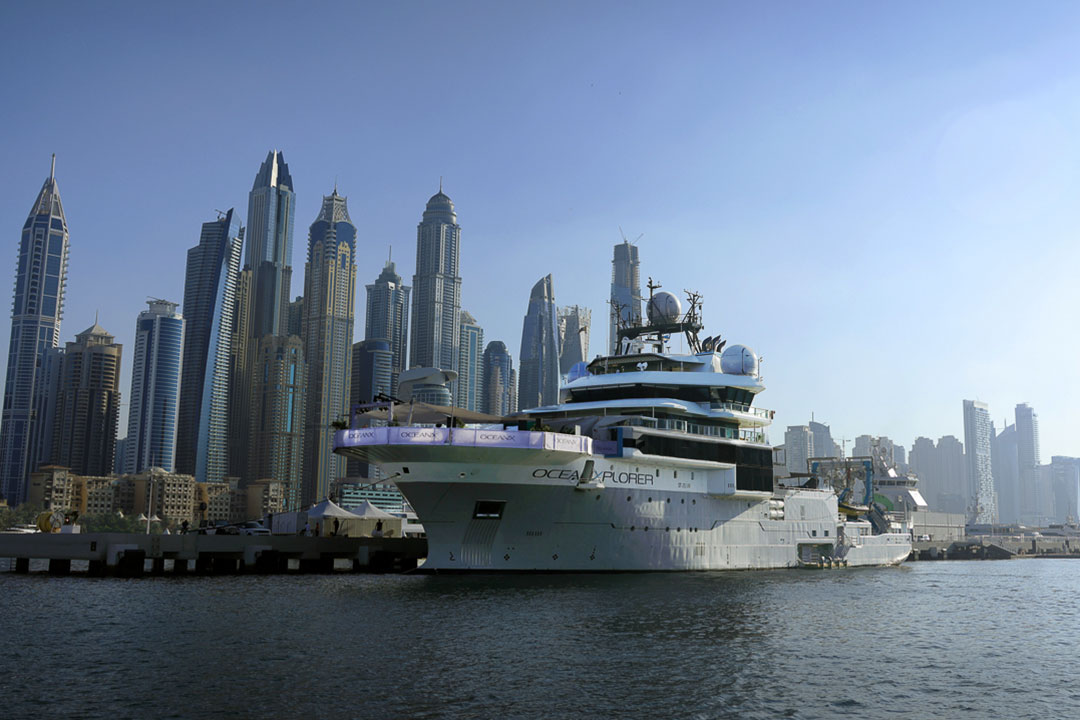Philippines in talks with OceanX for marine research

Kyle Aristophere T. Atienza, Reporter
SINGAPORE — US-based exploration startup OceanX on Wednesday said it is in talks with the Philippine government to conduct marine research in its waters to help harness the potential of its blue economy.
Its flagship vessel OceanXplorer, which carries four deep sea vehicles and four labs, would probably conduct research and exploration activities in Philippine waters next year, science program director Mattie Rodrigue told BusinessWorld during a media tour of the ship on the sidelines of the Asia Philanthropy Summit here.
“We’ve just started discussions about a collaboration… with the Philippine government to bring OceanXplorer and conduct scientific work in the area,” she said. “We’re hoping that after our mission is completed in Malaysia and our talks progress successfully with the Philippine government, then we’ll be able to get the vessel in as early as next year.”
The global ocean exploration nonprofit in March said it would embark on a series of research expeditions to better understand Southeast Asia’s marine biodiversity. This includes missions in Indonesia and Malaysia, where it will work with government agencies and scientists to study the ocean for better science, policy and economic decisions.
Two of the four vehicles aboard the 87.1-meter OceanXplorer are manned submersibles that can go as deep as 1,000 meters.
The ship, which has Hollywood production capabilities, also has two 6,000-meter remote-operated vehicles. It uses state-of-the-art optical technology to stream ocean exploration in real time.
Ms. Rodrigue said OceanX partners with government agencies and local scientists for the “stewardship of marine resources.” “We do an in-country request for scientific proposals.”
Philippine ocean-based industries grew by 21.1% in 2022, accounting for 3.9% of the country’s economic output, according to the state statistics agency. But local economists have said the country should do more to maximize the benefits from the ocean.
The Philippine government has included a blue economy bill in its list of priority legislation this year. The measure seeks to create a comprehensive framework and boost multisectoral coordination in managing the country’s marine and coastal resources.
The Southeast Asian nation has been seeking to explore oil and gas within its exclusive economic zone in the South China Sea, one of the world’s most important waterways that China claims almost in its entirety, as its sole indigenous source of natural gas is expected to run dry by 2027.
Reed Bank, which is near a Philippine feature that China had been patrolling in recent months, could hold up to 55.1 trillion cubic feet of natural gas and up to 5.4 billion barrels of oil, according to the United States Energy Information Administration.
President Ferdinand R. Marcos, Jr. has said his government seeks to pursue exploration activities in nonconflict areas of the South China Sea.
The Philippine government has cited the destruction of coral reefs near features it claims in the waterway.
The Center for Strategic and International Studies in February said China had destroyed at least 21,000 acres of coral reefs within the Philippines’ exclusive economic zone.
Another think tank, the Asia Maritime Transparency Initiative, also attributed coral reef destruction in the waterway to Chinese activities such as dredging, island-building and clam harvesting.
‘FULL PICTURE’
OceanX said deep sea research in Southeast Asia and other parts of the world has been underfunded.
“Every country doesn’t necessarily contribute resources to understanding the deep sea,” Ms. Rodrigue said. She added that blue economy goals have been largely centered on coastal ecosystems, often ignoring the potential of the deep sea to contribute to economic growth.
“The entire ocean space and all of these ecosystems are intertwined and connected,” she said. “So often, the understudied areas in these regions are going to be the deep sea. If scientists are able to access technology, that will then allow them to access those deep spaces.”
“That’s really the way to get a full picture of the environment, to drive forward in blue economic progress,” she added.
OceanX said only 25% of the world’s ocean floors have been mapped, with its flagship vessel having explored 145,000 square kilometers so far.
“In the proportion of the entire global ocean it’s just a drop in the bucket,” Ms. Rodrigue said. “But we hope when we go to different areas [we can help] develop and support their own mapping programs. There are vessels, ships, cargo ships moving back and forth and all have the ability to at least generate data.”
OceanX is the brainchild of Mark Dalio, a former filmmaker at the National Geographic, and his father Ray, the billionaire philanthropist behind the investment firm Bridgewater Associates.
The father-and-son team is behind the Singapore-based Dalio Philanthropies, a founding core member of the Temasek Trust’s Philanthropy Asia Alliance.
OceanX supports the Seabed 2030 project, which aims to map all of the world’s oceans by the end of the decade. OceanXplorer, which first sailed in 2020 in the Red Sea, is manned by more than a dozen nationalities including Filipinos.
The philanthropic alliance on Tuesday launched an initiative that seeks to generate funding for sustainable projects involving the blue economy, sustainable land use and inclusive education.
“The so-called Blue Oceans Community under the initiative will focus on the conservation and sustainable use of oceans, seas and marine resources, with a focus on Asia,” according to a statement from the alliance.
“It will look at science and exploration to build our connectivity to, and appreciation of, the importance of oceans and their related marine and coastal ecosystems,” it added.
